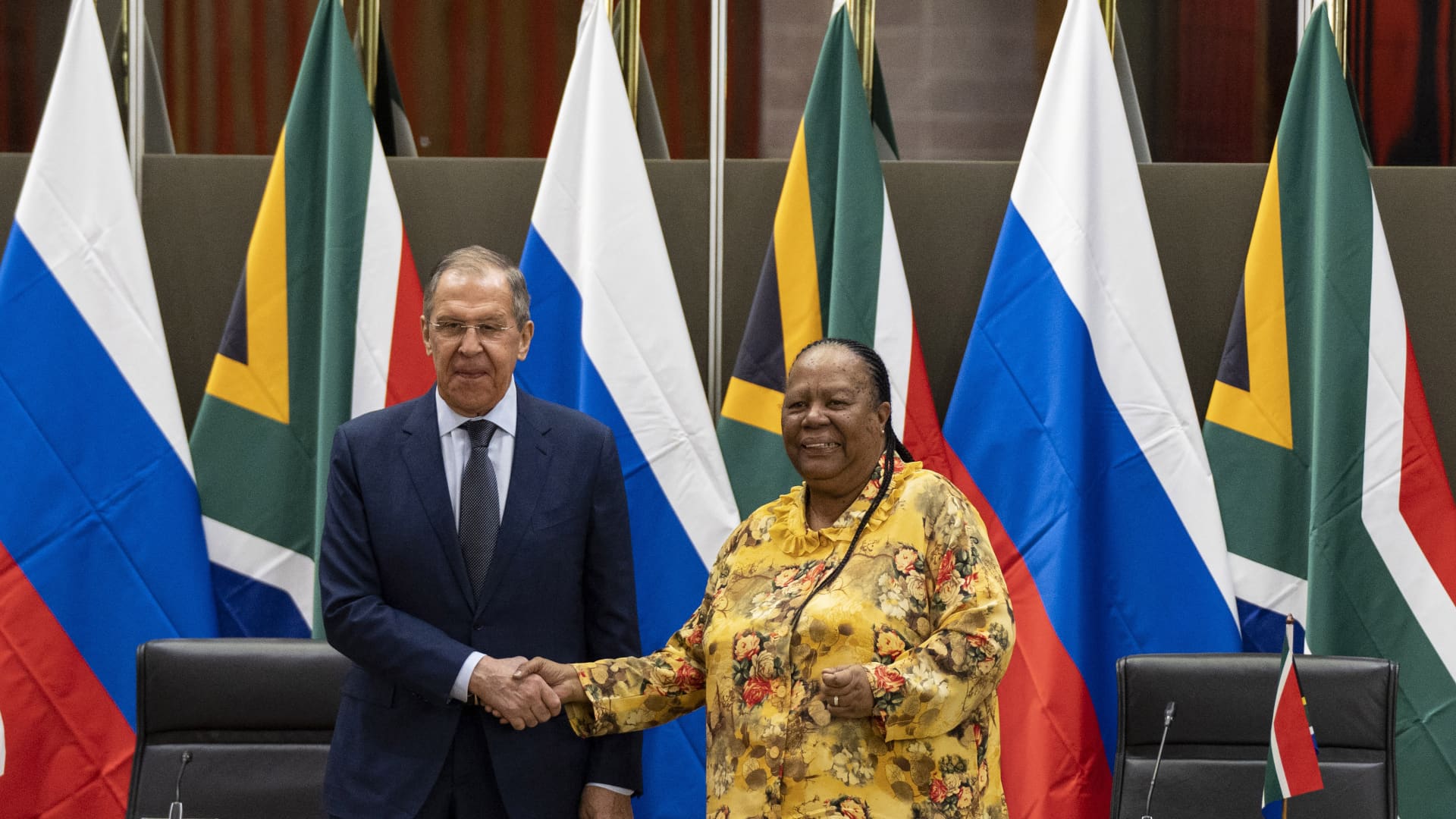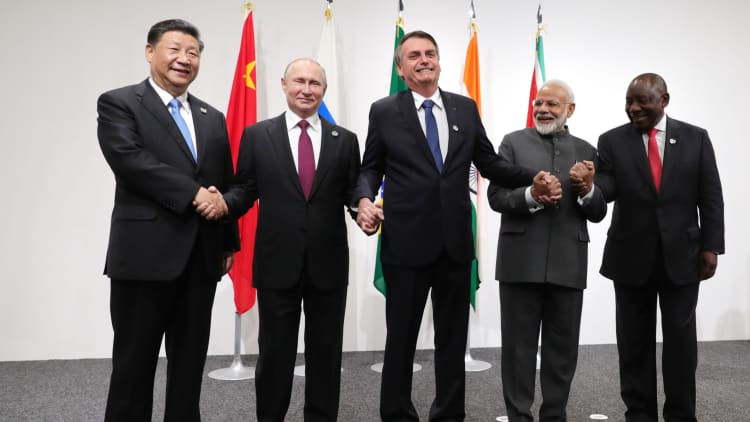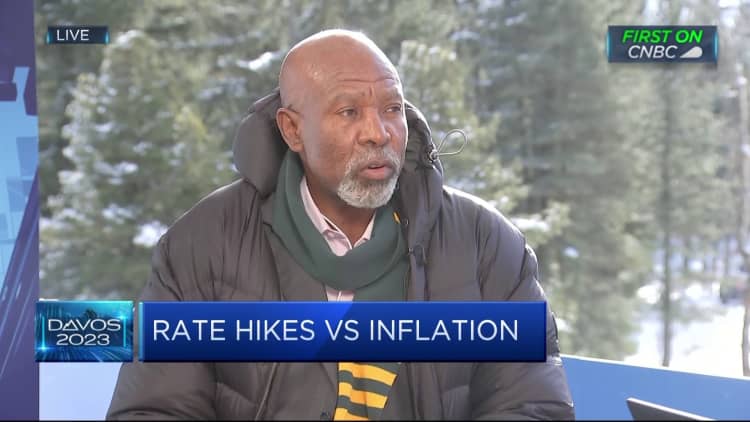
PRETORIA, SOUTH AFRICA – January 23, 2023: Russian Foreign Minister Sergey Lavrov (L) met South African Foreign Minister Naledi Pandor (R) during his official visit to Pretoria.
Ihsan Hafeci/Anadolu Agency via Getty Images
Russia and South Africa this week pledged to boost bilateral relations and will embark on a joint military exercise next month, coinciding with the anniversary of the invasion of Ukraine.
Russian Foreign Minister Sergei Lavrov visited Pretoria as part of an African tour, his second since the invasion, which will reportedly also take him to Botswana, Angola and Eswatini.
Diplomatic analysts told CNBC that the tour is primarily an affirmation that Russia is “not isolated,” sending a message that despite Western sanctions and efforts to banish it from the world stage, key strategic alliances remain.
On February 24, 2022, shortly after the Ukrainian invasion, South Africa urged Russia to immediately withdraw its forces from Ukraine. But since then the tone has changed. It was South Africa One of 15 African countries to abstain in the subsequent UN vote In March to condemn the Russian aggressive war.
At a joint press conference alongside Lavrov on Monday, South African Foreign Minister Naledi Pandor said it would be “simplistic and childish” to demand Russia’s withdrawal during their meeting, and hinted at the “massive arms transfer” that has occurred since then from the West. Powers to support Ukraine’s military efforts.
Pandor also praised the “growing bilateral economic relations” between Pretoria and Moscow, along with “political, economic, social, defense and security cooperation”.

She stressed the multilateral responsibilities of the BRICS bloc (Brazil, Russia, India, China and South Africa) of the leading emerging economies in a changing global landscape.
South Africa will host BRICS this year, and the ruling African National Congress has suggested that Pretoria might use the presidency to push for admissions of new members to expand the bloc’s presence, challenging the hegemony of global superpowers.
“The current global geopolitical tensions clearly point to the need to create institutional mechanisms of privileged shape and global confidence to promote and support global peace and security — the BRICS countries must play a proactive role in emerging processes and ensure they are part of a global redesign,” Pandor said.
Although it called for “a peaceful end to the war through diplomacy and negotiations,” there was no direct condemnation of the invasion.
Timing of joint naval exercises ‘may have been deliberate’
South Africa will host joint naval exercises with Russia and China between February 17 and February 27. Pandor responded to the concerns by saying that hosting such operations with “friends” was part of the “natural course of relations”, criticizing the idea that only certain countries are partners. accepted.
Stephen Gross, chair of the African Governance and Diplomacy Program at the South African Institute of International Affairs, told CNBC on Tuesday that the timing of the joint exercise, dubbed “Mosi” which means “smoke” in the Tswana language, “will draw attention internationally.” He doubted it “could have been intentional”.
“Obviously one can choose the timing of these things and choose the timing that will be appropriate on an anniversary, perhaps it is South Africa’s way of saying ‘Look, we are an independent sovereign country and we will conduct our foreign policy the way we see fit, the way that advances our interests, and we won’t be told or smashed by anyone.”

South Africa was pressured by Western partners to join opposition to the invasion of Ukraine, and adamantly refused to be “bullied”, in Pandor’s words, into taking sides.
White House press secretary Karen Jean-Pierre said Monday that “the United States has concerns about any country… playing with Russia while Russia wages a brutal war against Ukraine.”
Central to Russia’s appeal to many African nations, analysts have highlighted, is its ability to promote itself as an anti-imperialist resistance, capitalizing on popular discontent with the likes of the US, UK and France over a history of Western oppression on the continent.
Eleonora Tavoro, senior research fellow at the Center for Russia, the Caucasus and Central Asia at the Italian Institute for International Political Studies (ISPI), told CNBC on Tuesday that despite its small trade relationship with the African continent compared to the EU’s, Russia has been able to benefit from perceived “anti-imperialist sentiments” and “fanatical attitudes” from the West.
Building on ‘anti-colonial’ sentiments
In her opening remarks on Monday, Pandor pointed to the Russian Federation’s support 30 years ago – then as part of the Soviet Union – for the anti-apartheid movement in South Africa that would go on to form the ANC’s base.
“Ironically, this very element is playing to ends by the Kremlin to justify this war of aggression against Ukraine,” Tavoro said, noting that there is a lack of sympathy among African nations towards Ukrainians as victims of imperialism.
“I think Russia uses information and propaganda very skillfully to build this narrative, but this narrative works because there really is this deep culture of anti-Western sentiment in countries like South Africa, and that has to do with their history of being victims of imperialism.”
Russia’s growing influence has been evident in recent weeks during protests in Burkina Faso, where demonstrators condemned France and the regional bloc ECOWAS while waving Russian flags.
OUAGADOUGOU, Burkina Faso – January 20, 2023: A banner of Russian President Vladimir Putin is seen during a demonstration in support of Burkina Faso’s President Captain Ibrahim Traoré and demanding the departure of the French ambassador and military forces.
OLYMPIA DE MAISMONT/AFP via Getty Images
Grosse explained that “there is no doubt that there is growing resentment against France in its former courts and that Russia thrives in chaos, and its institutions fill the gap with France’s decline.”
He also noted that Russia’s social media operations, along with promoting pro-Kremlin messages, have also been built on “existing fault lines, such as anti-French sentiment or anti-gay sentiment”, and rivalry between political blocs.
“Countries like South Africa have really bought into Russia’s narrative that it’s an anti-colonial power, that it supports the little man, that having one superpower and having that superpower being the United States is not good for the world, that there has to be multipolarity, that there has to be alternative sources.” energy and energy distribution.
“This resonates, it resonates strongly and it resonates strongly in countries that have been marginalized by the West as well.”
African countries are not ‘an arena for great power competition’
Just last month, Lavrov, new Chinese Foreign Minister Chen Gang and US Treasury Secretary Janet Yellen embarked on tours of Africa, with Yellen set to meet South African President Cyril Ramaphosa this week.
US Secretary of State Anthony BlinkenFrench President Emmanuel Macron and German Chancellor Olaf Scholz also visited the continent last year, while US President Joe Biden held an African-American summit in December, seen as an attempt to regain some of the influence Washington lost over China over the past decade. Or more.
Both Tavoro and Grozd point out that the outburst of diplomatic activism should not be seen as a “scramble for Africa”, as the continent’s negotiating power means it now has a seat at the table.
“I think from an African point of view we prefer not just to be classified as an area where great powers compete, but to recognize that African governments and African societies are active in their own right, so they are not pawns in the hands of someone who is just players sitting around the board,” Gross said.
Goree Island, Senegal – January 21, 2023: US Treasury Secretary Janet Yellen (R) receives a diploma from Goree lawyer and Mayor Augustin Senghor (L) during a visit to Goree Island off the coast of Goree. Dakar on January 21, 2023.
Cello/AFP via Getty Images
Tavoro also argued that comparisons to the Cold War or the simplification of diplomatic visits to competition for resources miss the major paradigm shift currently underway.
“Sometimes we just forget that these African countries have their own agency and ultimately it’s up to them to decide whether a relationship with China or Turkey or Russia is worthwhile and whether it’s beneficial for them to maintain, say, a balanced approach, like dealing with With everyone who wants to do business.
“It is also up to them to shape their relationship with these outside players.”

“Travel specialist. Typical social media scholar. Friend of animals everywhere. Freelance zombie ninja. Twitter buff.”





More Stories
Taiwan is preparing to face strong Typhoon Kung-ri
Israel orders residents of Baalbek, eastern Lebanon, to evacuate
Zelensky: North Korean forces are pushing the war with Russia “beyond the borders”